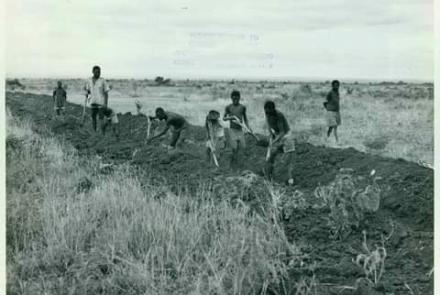Recruitment into the Kikuyu Central Association and the liberation struggle
Kenyatta was introduced into politics and in essence to the liberation struggle by James Beuttah, who was connected to the emergence of the Kikuyu Central Association. Beuttah and Kenyatta first met in 1924 while Beuttah was on a mission in Nairobi’s Pumwani where he intended to bring together Christian and Muslim Kikuyus. The name of James Beuttah, who worked as a post office manager, however never appeared on the documents which marked the emergence of KCA from its underground cell at Kahuhia into open political activity even though he known to be linked to the organization. In 1925 or early 1926 he was moved from Nairobi to Uganda but he kept in touch with the Kahuhia group and also with Kenyatta. In Beuttah’s absence, KCA members would approach Kenyatta to assist them in translating and drafting letters. For this, he would be paid not in cash but with beer and pricey Goan spirits. With time, it became expensive to hire him and a permanent job as a secretary was then considered. He obliged, though putting his other job at risk, and with his sacking, he asked for an equivalent salary, a motor bike and other perks. This was to enable him to fully concentrate on KCA activities.
Towards the end of 1927, KCA wrote to Beuttah in Uganda asking him to be their representative to London. But he considered his responsibilities towards his family too great and replied by suggesting the names of several men, of whom Kenyatta was one, for his good English. Kang’ethe, an official of KCA, approached Kenyatta who took his time to consider his position: Grace was expecting a second child; he was paying for both his brother Muigai at Alliance High School and for his small son at the central school at Thogoto. By now, KCA was gaining popularity as its membership grew and in 1927, members established an office in Nairobi. By 1928, the DC of Fort Hall could write, ‘It can no longer be said that KCA is unrepresentative of the Kikuyu people. It includes in its ranks a vast proportion of the more enlightened and progressive youth and wields an increasing influence on the council of elders.’
Kenyatta’s name was publicly linked to the political movement for the first time at the beginning of 1928. On 14th February, he accompanied KCA members to Government House, Nairobi, to give oral evidence to the Hilton Young Commission, rather as an interpreter, than in any executive capacity. The KCA delegates made no impression on the commissioners who were disinclined to allow any prospects of native representation. A month later, Kenyatta attended a meeting at Kahuhia at which the Provincial Commissioner and several local Chiefs were also present. It was held to assure the government officials of the good faith and the sound intentions of the KCA. Kenyatta said that KCA was anxious to do things in the proper way and would gladly correct any mistakes it might be making. In reply, the PC stressed that the Association could not claim to speak for the whole tribe, but he concluded that he wished to express his pleasure at the meeting and hoped that the progress and good understanding now in evidence would continue.
In May 1928, a Kikuyu vernacular periodical called “Muiguithania” appeared. The KCA slogan ‘Pray and Work’ was displayed on its title page and the editor’s name was given as Johnstone Kenyatta, Secretary of the KCA. In the summer of 1928, the subject of Kikuyu land rights came to a head and Edward Grigg, the colonial Governor, proposed setting up land boards to hold all land in the native reserves in trust for each tribe. This would regulate land exchanges, supervise improvements and generally demarcate the areas within which the tribe might exercise authority over its own land in its own way. But the Hilton Young Commission threatened to pre-empt the subject and on 18th June the proposed bill was suspended.
During this time Kenyatta had to step cautiously through the mine fields of colonial politics and his contributions to ‘Muiguithania’ were certainly politically correct: he supported the churches, district commissioners and chiefs. In September, it featured an article on the word ‘Association’ in which for the first time the phrase Kikuyu “Karing’a” was used. This meant, ‘Real Kikuyu’ and the idea was that all who were true Kikuyu belonged together. It also implied a revival of old Kikuyu customs. Such articles were an attempt to unite the tribe. A major purpose was also to raise funds to pay for Kenyatta’s passage to England.
Kenyatta was bent on getting to England and by December, KCA decided they had collected enough funds. At a gathering in Pumwani, Kenyatta took a Bible in his hands, with some earth and swore before them all that while away and on his return, he would serve them all fully. They, in their turn, swore to look after his wife and family.
On 16th February 1928, two days after his appearance before the Hilton Young Commission, Grace gave birth to their second child, a girl, who was named after his mother, Wambui, and later baptized, Margaret. She later became the first female Mayor of Nairobi. The young child scarcely knew her father, but she was to become his closest confidante in the years ahead and was the child who seemed most to resemble him. At this time, Kenyatta mostly stayed with his associates rather than with the family who stayed at Dagoreti. He was an affectionate father but, unlike Beuttah, he was willing to sacrifice family life for his new calling.


